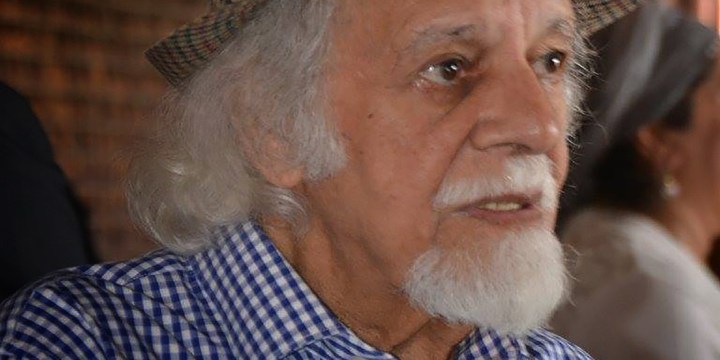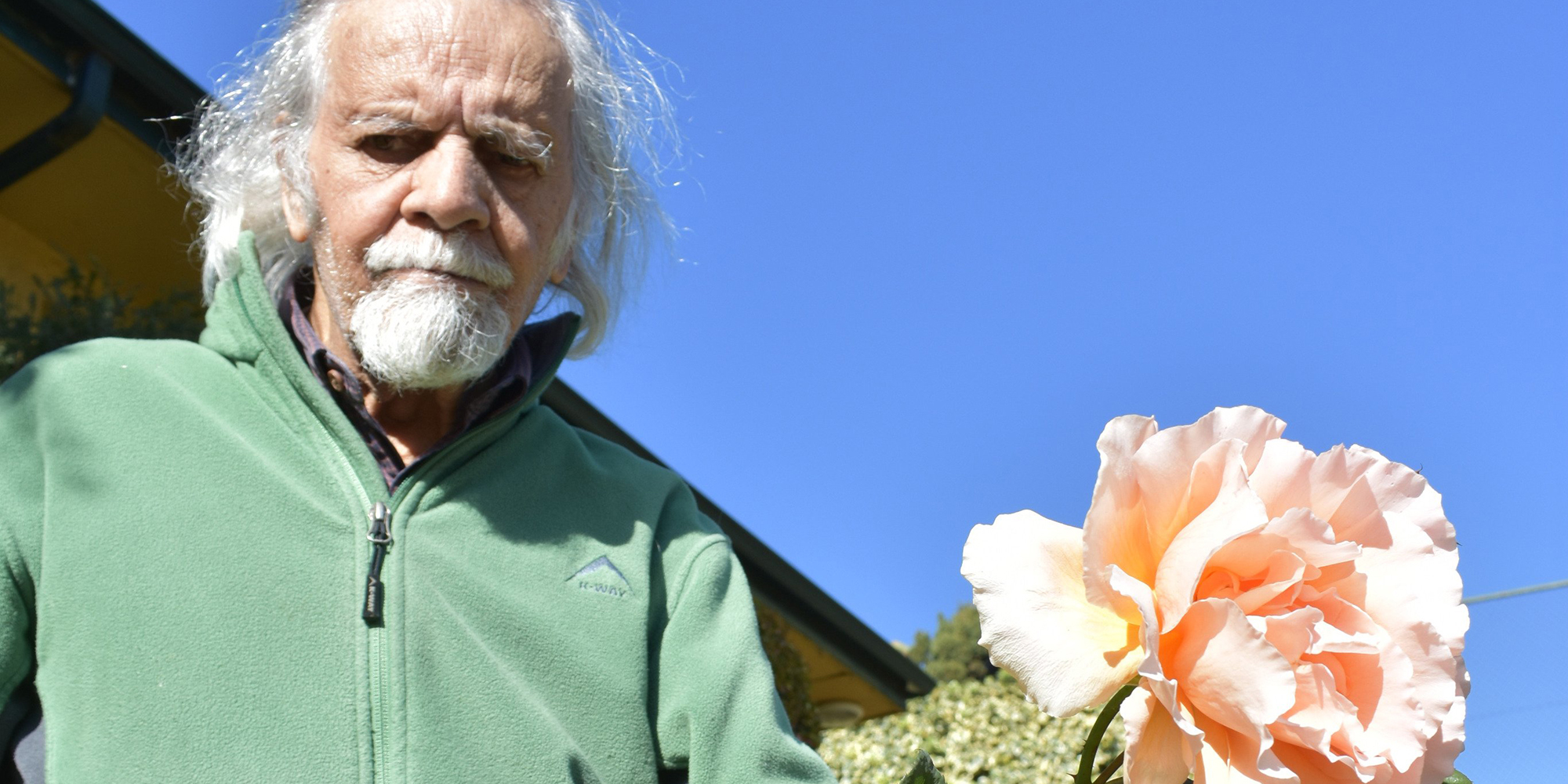BOOK EXTRACT
Moosa ‘Mosie’ Moolla (1934-2023) — revolutionary, leader, democrat and elder statesman

Our dear elder, comrade, friend, leader and mentor Mosie Moolla died on 25 March at the age of 88. It was a sad day for all who enjoyed his vibrance, good humour and insight. Here is Moolla’s profile from the book Men of Dynamite published by the Ahmed Kathrada Foundation.
Moosa “Mosie” Moolla — revolutionary, leader and democrat — has over the years paid a heavy price for his beliefs and principles. During the course of his life he was cruelly separated from his children, detained on numerous occasions, faced the chilling prospect of being hanged when tried for treason and spent 28 years in exile.
Mosie was born on 12 June 1934 in the small western Transvaal town of Christiana, where his father ran a successful import-export business. The family was forced to relocate to Bloemhof, a nearby town, following the Great Depression of the 1930s. Mosie did his primary schooling in Bloemhof. Since there were no high schools catering for blacks, Mosie was forced to move to Johannesburg in 1949 to pursue his secondary education.
The exciting developments in national and international politics during this period sparked Mosie’s curiosity about current affairs. He recalls the 1946-47 Passive Resistance Campaign against the Ghetto Act, India’s march to independence and the Indonesian struggle for freedom.
Boarding with a Congress stalwart, Ouma Bhayat, and surrounded by Transvaal Indian Congress (TIC) activists such as Dr Vallabh Jaga, Dr Zainab Asvat and Dr Abdulhaq Patel, Mosie was recruited into the newly launched Transvaal Indian Youth Congress (TIYC). The very first campaign he actively participated in was the 1950 May Day strike in protest against the Suppression of Communism Act.
During this period, the Picasso Club was formed for the purpose of writing political slogans on public walls. Among its members were Mosie, Ahmed Kathrada, Babla Saloojee, Faried Adams and Solly Esakjee. Mosie remembers one particular slogan painted on the all-white Johannesburg Public Library: “WE BLACK FOLKS WANT TO READ”. This was removed by the authorities the next day, only to be replaced a short while later with “WE BLACK FOLKS AIN’T READING YET”. The Star newspaper carried the story and commented on the sloganeers’ sense of humour.
Actively participating in the TIYC by silk-screening and putting up posters, writing and distributing leaflets, Mosie quickly moved up the ranks of the youth movement. In a short space of time he was elected to the organisation’s executive committee and then as the joint honorary secretary and finally as chairperson, a position he held for nearly a decade.
In his matriculation year, 1952, Mosie participated in the Campaign for the Defiance of Unjust Laws and was imprisoned for close to a month. Due to his detention, Mosie was expelled and could not write his matric exams.
At the beginning of the campaign for the Congress of the People (COP), the Congress movement asked Mosie to leave his administrative job in a manufacturing company to serve full-time on the Secretariat of the National Action Council of the COP.
Most members of the Secretariat such as Walter Sisulu, Joe Slovo, Rusty Bernstein and Yusuf Cachalia were banned under the Suppression of Communism Act. It became Mosie’s major responsibility to ensure that all decisions of the Secretariat were effectively conveyed to all provincial and regional committees of the National Action Council.
He served in this capacity until the culmination of the COP campaign with the adoption of the Freedom Charter in Kliptown on 25 and 26 June 1955. Mosie was later elected to the executive of the TIC and also served as its full-time organiser.
Treason Trial
In December 1956 Mosie, along with 155 others, was arrested on a charge of high treason. He observed, “The accused represented virtually every strata of South African life — professionals, unskilled workers, peasants, atheists, the religious, artists, white, black, coloured and Indian.” The Treason Trial exacted a heavy price on all: lives were disrupted, the daily burden of travel to the Special High Court in Pretoria and, tragically, in some instances the breaking up of family life.
He also recalls the support and acts of solidarity with the accused. Money for bail was raised within hours. The women provided two meals every day for five years, for all the accused, especially Mrs Thayanagie Pillay and Dr Zainup Asvat. There were crowds of supporters daily outside the court.
Mosie further emphasised that the state inadvertently brought together leaders such as Chief Albert Luthuli, Professor ZK Matthews and Nelson Mandela and had created a forum for conferencing and robust political debate. He fondly remembers Vuyisile Mini’s bass-baritone when raised in song. Mini composed freedom songs, and was executed in November 1964 by the apartheid government.
Mosie was one of 30 — including Nelson Mandela, Helen Joseph, Ahmed Kathrada and Walter Sisulu — to see through the entire trial until 1961. Despite the prosecutors believing that they had a strong chance of conviction, they were all acquitted in March 1961, after being on trial for five years.
On 10 May 1963, Mosie was among the first to be detained under the newly promulgated 90-day detention law. He was held in solitary confinement at Marshall Square Police Station. He later escaped from the police station along with Abdulhay Jassat, Harold Wolpe and Arthur Goldreich. Mosie then illegally left the country and made his way to Dar es Salaam, which housed the exiled leadership of the ANC.
In 1964 Mosie joined Umkhonto weSizwe and in 1965 was sent for a year to Odessa (now Odesa and now in Ukraine) in the Soviet Union for military training. His was the second unit to be sent to Odessa and his group included Josiah Jele (who served on the ANC’s National Executive Committee), Peter Tladi and Jacqueline Molefe who, after 1994, became a major-general in the SANDF. In 1966, after Odessa, Mosie went to Moscow for a six-month stint in intelligence training. On his return to Dar es Salaam, he continued his work within the ANC’s Department of Publicity and Information as editor of Spotlight on South Africa.
From the time of his escape in 1963 until 1968 the apartheid state denied Mosie’s wife, Zubeida, and their children, Tasneem and Azaad, passports. Finally, in 1968, they were granted passports and travelled by train to Lusaka, Zambia. Mosie joined them for a few days at Tunduma, at the Tanzania-Zambia border. This was the first time that Mosie saw his son, who was born two months after he fled the country. Azaad was now five years old, and his daughter, Tasneem, was six years old.
After the brief reunion, Mosie returned to Dar es Salaam and Zubeida to Lusaka with the children. Zubeida, who could not obtain a work permit in Zambia, was forced to send the children back to South Africa to live with her parents because she could not support them. This separation was very painful for all of them.
In 1969, Mosie was deployed to Bombay (now Mumbai) to work with South African students studying in India. The ANC’s Asian mission was in New Delhi, with Mendi Msimang as its chief representative and Molvi Cachalia as the deputy chief representative. In 1971, Molvi Cachalia retired and Mosie was appointed in his place. In 1972, Mendi was transferred to Tanzania and Mosie took over as chief representative.
In 1978, Mosie was sent to head the ANC’s Egypt and Middle East mission. He was also concurrently the ANC representative to the Afro-Asian People’s Solidarity Organisation. In 1982, he was reposted to New Delhi. In November 1989 he was deployed as the ANC representative to the World Peace Council and had to relocate to Helsinki, Finland.
In December 1990, after 28 years in exile, Mosie returned to South Africa. He was employed by the ANC’s Department of International Affairs based in Shell House. In 1991 he was elected as secretary of the TIC and served as a member of the TIC/NIC delegation to Codesa (the Convention for a Democratic South Africa negotiations designed to end apartheid).
In 1995, President Mandela appointed Mosie as the South African ambassador to the Islamic Republic of Iran. He held the post until 1999. From June 2000 until 2004, Mosie was high commissioner to Pakistan.
Zubeida (née Saloojee), Mosie’s wife and life-long partner, died on 3 April 2008. They were married for almost 47 years. Besides Tasneem and Azaad, he has another son, Afzal, who was born in New Delhi, India in 1972. Nelson Mandela gave his daughter, Tasneem, her middle name Nobandla, which means “she of the masses”. DM
Rashid Seedat, Razia Saleh, Prema Naidoo and Shabir Ballim (2009) Men of Dynamite: Pen Portraits of MK Pioneers. Ahmed Kathrada Foundation (publisher): Lenasia





















 Become an Insider
Become an Insider
Comments - Please login in order to comment.